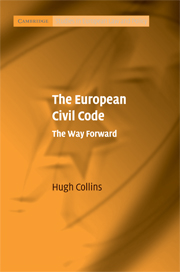Book contents
- Frontmatter
- Contents
- Preface
- Series editors' Preface
- Table of cases
- Table of treaties and legislation
- I Civil society and political union
- II The acquis communautaire in private law
- III The hidden code
- IV Private law and the Economic Constitution
- V Cultural diversity and European identity
- VI Respecting legal diversity
- VII Multi-level private law
- VIII Strengthening convergence
- IX Exploring the European Social Model
- Index
- CAMBRIDGE STUDIES IN EUROPEAN LAW AND POLICY
Series editors' Preface
Published online by Cambridge University Press: 26 February 2010
- Frontmatter
- Contents
- Preface
- Series editors' Preface
- Table of cases
- Table of treaties and legislation
- I Civil society and political union
- II The acquis communautaire in private law
- III The hidden code
- IV Private law and the Economic Constitution
- V Cultural diversity and European identity
- VI Respecting legal diversity
- VII Multi-level private law
- VIII Strengthening convergence
- IX Exploring the European Social Model
- Index
- CAMBRIDGE STUDIES IN EUROPEAN LAW AND POLICY
Summary
Hugh Collins' book on the future of European private law develops a distinctive argument for legal change in an increasingly well-trodden field of study. He makes a sustained and convincing argument for a different normative basis for legislative developments at the EU level as regards a putative European Civil Code. He wishes to distract private law from its current market integration focus, where the only politically acceptable justifications for interventions in private law relations can be found in the impact of failure to harmonise or actively to promote mutual recognition on the evolution of the single market for goods, services, persons and capital. Instead Collins, normative proposal links private law to European civil society, understood in its widest sense to include the multitude of everyday relations between persons. At present, these private law relations are regulated predominantly at the national or subnational levels. Sympathetic to arguments for closer integration, but specifically for reasons of promoting welfarism and social justice rather than political union as such, Collins rejects the monolithic ‘top-down’ approach of building common institutions or searching for a common European foreign policy favoured by EU institutional and many national elites. Rather, he wishes to see fostered the conditions for ‘bottom-up’ development rooted, as he puts it, ‘in the bonds for commonplace social interactions’. Through these will come the necessary community which can sustain, in turn, political development at the supranational level. Collins’ argument is ambitious, and requires a fully developed critique of the current acquis communautaire and a direct engagement with the legal competences and legal instruments of EU law as it exists.
- Type
- Chapter
- Information
- The European Civil CodeThe Way Forward, pp. xi - xiiPublisher: Cambridge University PressPrint publication year: 2008



